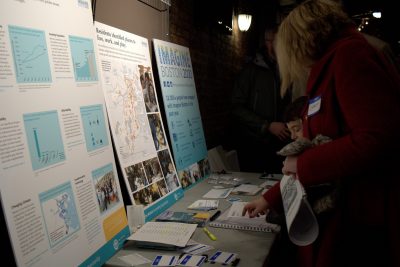
The City of Boston hosted an Imagine Boston 2030 open house Saturday afternoon at the Bruce C. Bolling Municipal Building in Roxbury to inform Boston residents about several of the program’s initiatives and invite them to play a role in shaping the future of the city.
Mayor Martin Walsh’s office is spearheading the Imagine Boston 2030 initiative, Boston’s first citywide planning process in 50 years, which aims to reform and improve the city’s provision of education, transportation, housing, infrastructure and more, according to the Imagine Boston 2030 website.
The first draft of the strategic plan, “Expanding Opportunity,” was released in November and includes a vision for Boston in 2030 crafted by a combination of data, research, opinions of more than 12,000 Boston residents and the priorities of several departments within the Mayor’s Office, according to the document.
The Department of Immigrant Advancement, Boston Public Schools, the Department of Economic Development and the Boston Public Health Commission were just a few of the agencies present at Saturday’s open house.
Natalia Urtubey, director of engagement for Imagine Boston 2030, said she coordinated the open house to show Boston residents the plans for the initiative before the second draft of the “Expanding Opportunity”document is released in the next couple of weeks.
“What we wanted to get out of this event is really to showcase to the public about how the city is working internally together to make sure that the document itself can be what it intended to be,” Urtubey said. “Our real hope is that after the planning process is done, all of these departments are taking the document and bringing them into reality.”
Urtubey stressed the importance of incorporating residents’ opinions and the issues they are most concerned about into the planning process.
“We really want to make sure that people feel like their vision is reflected here and that they’re feeling heard because everything that they’ve told us has essentially … [come] through in this document,” Urtubey said. “People were most concerned about housing, transportation, open space and education, all of which have had their own initiative and planning process feed into the document.”
Mary Driscoll, superintendent of BPS, said she came to the open house to inform Boston residents about the Build BPS project, an investment of $1 billion over the course of 10 years in the infrastructure of BPS.
Driscoll said the project is currently in its community engagement phase after the city first compiled a database of BPS building information.
“We’re beginning a phase of engagement with the community to get people to think about what investments, either renovations of current buildings, expansions of current buildings or new buildings, would make sense for the city,” Driscoll said.
Driscoll emphasized the importance of a strong public education system within the city of Boston because she said public schools attract new residents and benefit current ones.
“Schools are an incredible resource for the whole city, and if you have a strong, vibrant school system it draws and holds on to residents,” Driscoll said.
Several residents in attendance said they went to the open house to learn about the Imagine Boston 2030 program’s initiatives and participate in the planning process, as the city stresses the importance of civic engagement in the planning and implementation of Imagine Boston 2030.
Wayne Beitler, 49, of Roslindale, a community planner for the town of Easton, said he attended the open house because he is interested in staying up to date with the city’s ongoing plans.
“Having transportation and housing and employment equity throughout the entire city is a very big priority and I’m pleased to see that that is something that this initiative is being very mindful about,” Beitler said.
Beitler said he would have liked the event to offer more information on how the city is planning to protect its environmental resources while undergoing reconstruction.
“I’m a little concerned that so much of our economic activity and infrastructure is very close to sea level on the Boston waterfront,” Beitler said. “I’m very concerned that in decades to come we will see very expensive damage occur to things like our electricity, our subway system and a lot of our real estate development down at the waterfront.”
Gisella Soriano, 33, of Dorchester, said she hopes that Imagine Boston 2030 will address economic disparity within the city.
“The city of Boston is made of very wealthy people that can live and afford a beautiful home with all the resources and amenities, and then you have individuals who struggle to find a decent apartment,” Soriano said.
Robert Lauricella, 69, of Watertown, emphasized the importance of garnering more public support for the Imagine Boston 2030 program.
“The public doesn’t care about the generalities and the big mission statements and the big plans, so when it gets to the specifics … I think they’re making progress,” Lauricella said. “There are good issues here, but it really does need tremendous public support.”


















































































































